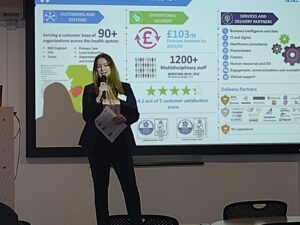On November 20th, UKAI hosted a Championing Equality in AI summit, featuring lively, collaborative discussions between policymakers, activists, industry leaders, technologists, academics, and legal experts to explore the development of fair, inclusive, and accountable AI systems, from design to deployment.
The summit consisted of a series of three high-level panels, keynote contributions, and a fireside chat. It tackled several key issues, asking where AI is making strides in improving equality and where it may be reinforcing harmful biases.
Also broached were themes such as the role of AI in addressing safety, risk, and gender-based violence, and questions around how leaders and allies can embed fairness into procurement, governance, and real-world deployment. Participants all called for renewed opportunities for international collaboration to establish ethical, transparent AI ecosystems.
The event was organised by UKAI Women in AI organiser and Senior Policy Advisor Cecilia Jastrzembska, with support from fellow members of UKAI’s Women in AI working group. The event’s panel chairs included VP and Global Data Privacy Officer at Wipro Ivana Bartoletti, AI and Ethics Consultant at Full Fathom Five AI Claire Roberts (née Smith), and CEO/Principal Consultant, CKC Cares Ventures Ltd Cha’Von Clarke-Joell.
This summit facilitated insightful discussions and valuable collaboration on ensuring AI serves as a force for good in shaping a more equitable future.
Should Misogyny be classified as a “hate crime”?
The panel opened with a call to collective engagement, as Cecilia Jastrzembska urged participants to “be part of the conversation.” She described her work on a campaign with the European Parliament to classify misogyny as a hate crime, noting that “one woman is killed every three days in the UK and that has not changed since 2009.” Her message was that the norms established online will “materially affect our physical realm.”

Fighting the “global crisis” of violence and misogyny in AI
Head of AI at Globeducate Clara Hawking followed by emphasising that violence and misogyny constitute “a global crisis,” cautioning that the issue is too often framed as a women’s safety problem instead of “a cultural engineering problem” in which boys are “at the centre of it” and thus also harmed.
She described four forces shaping online misogyny: platforms that reward engagement, content that spreads quickly because it elicits strong reactions, generative tools that make creating sexualised or abusive content “incredibly easy,” and malicious groups using gamification to recruit and radicalise youth. This environment, she warned, is becoming “a training ground for a belief system of our entire generation.” She urged governments to act, insisting that “technology that’s harming children is unacceptable” and must be met with criminal and financial accountability. Without intervention, she said, “we will lose that whole generation.”
“One woman is killed every three days in the UK and that has not changed since 2009″ ~ Cecilia Jastrzembska
Transforming theory into real-world action
Researcher on Bias in AI Data at Durham University Dr Sarah Wyer widened the lens to technology strategy. She argued that a new wave of AI systems is designed not just to capture attention but to foster “emotional connection,” warning of violent simulations becoming normalised. She described scenarios where boys engage with AI “pretend girlfriend” chatbots and enact extreme violence without consequence. Such behaviour, she stressed, “doesn’t just stay within that space” and will translate into real-world harm. “If we don’t act now,” she said, “we’re going to see a huge spike in sexualised violence against women.”
“Technology that’s harming children is unacceptable” ~ Clara Hawking
Cha’Von Clarke-Joell highlighted the need for “allyship and AI leading systems that work for all,” stressing that men hold the majority of senior AI roles and thus play a crucial part in preventing AI from becoming “an accelerator of bias.” She framed the moment as part of a larger “digital poly crisis.”
The importance of male allyship
Male allyship advocate and Founder of Male Allies UK Lee Chambers said men must “consider their role within accelerating gender equality in tech,” noting that better diversity improves “data, design,” and decision-making. Panny Antoniou connected inclusion to national security, stating that in defence contexts, imbalance is “a matter of life and death,” because homogenous teams produce “dangerous outcomes.” Inclusion ensures systems work across borders and reduce “critical operational blind spots.” Claire Roberts corroborated this sentiment, insisting that “this topic and the importance of these kinds of conversations are more important than personal accolades”.
Creating more robust ethical frameworks
Diversity and Inclusion Consultant Lea Rattei argued that organisations must treat bias like security vulnerabilities, suggesting that “it needs to financially hurt” when companies fail. Compliance frameworks, she argued, should resemble SOC2 or ISO audits. Her core message was that we must “stop teaching women how to survive the system and start teaching men how to change the system.”

The summit concluded with Zahra Shah and her call to action: “The time for talking is over. We are now in the era of action.” Ultimately the summit convened lively discussions among progressive, forward-thinking experts, each committing to embedding the summit’s agreed structures for ethical AI regulation and digital literacy into their companies.
UKAI is committed to supporting and encouraging female leadership within the AI industry and looks forward to hosting further online and in-person events for UKAI members and supporters, across the UK. The videos from this online summit will be shared on UKAI’s Website and Youtube channel over the next few weeks.



